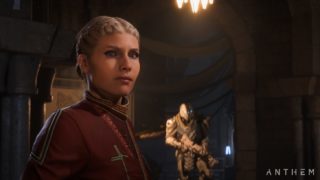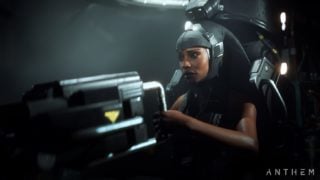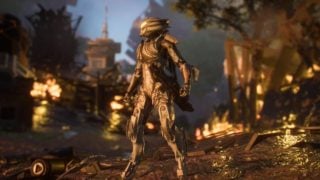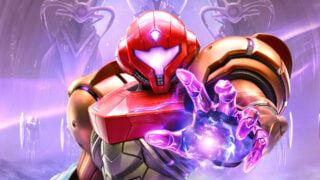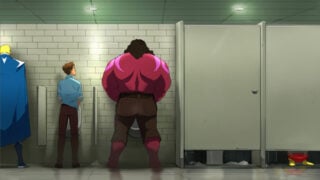Launch Review: Anthem is a game with an identity crisis
BioWare’s slick mech mechanics can’t combat its lukewarm core
- Game Director
- Jon Warner
- Key Credits
- Mark Darrah (Executive Producer), Derek Watts (Art Director), Sarah Schachner (Composer)

Disclaimer: This is a launch review of a large service game that is likely to receive significant post-launch content. As such the game experience is likely to evolve as the game’s developer adds and changes its systems over the following months and years. This review is accurate as of the launch window.
There’s an intriguing game buried somewhere in Anthem, lying broken beneath its loot and structural frustrations like chunks of fossilised dinosaur bone.
That game begins, as you might expect, with the Javelins – the flight-capable mech suits that are your only means of exploring the world of Bastion, a temperate planet racked by supernatural cataclysms where humans cower in quasi-medieval fortresses. Piloted in third-person, Javelins let you glide and plunge merrily through an open world defined by verticality, its cliffs and forests bedecked with wind-lashed ribbons of falling water.

There are four Javelin types, unlocked one by one over the course of the game – each a distinct and flavourful take on the RPG classes for which developer BioWare is known. The Colossus is a tank, ploughing through attackers behind its enormous shield. The dainty Interceptor relies on speed rather than armour, pirouetting through bombardments that would otherwise wreck it.
The imperious Storm supplies artillery support, hovering over the fray with a fistful of lightning, and the Ranger, finally, is the Iron Man-of-all-trades, bopping targets with no-nonsense rockets and grenades. Their primary and secondary guns aside, each Javelin sports customisable offensive and defensive abilities that are effectively spells on loan from Dragon Age. Each also has an ultimate ability, to be slowly charged up and reserved for use against boss creatures who may take tens of minutes to down.
The ultimates are devastating indeed – the Storm, for example, unleashes a trio of elemental slamdunks, dismantling heavy turrets with a snap of its fingers. Just as useful as the damage dealt, however, is the period of invincibility each ultimate confers, in a game that routinely throws dozens of enemies at you from all angles and elevations. You’ll often rush into melee range as much for the health and shield refills enemies drop as the thrill of a crunchy finisher.
The note of desperation there reveals the shortcomings of Anthem‘s ability design when it comes to co-op, which supposedly represents the game at its best – it’s light on ways to meaningfully collaborate with other players. Co-op does have its rewards, however – combos, for instance, where you prime an enemy with elemental damage so that a friendly can nuke them with a complementary ability.
And the thrill of zipping about in formation is distraction enough from the lack of complex teamplay. One of the quieter delights of Javelin piloting is Anthem’s heat mechanic, which limits your flight-time unless you cool off by skimming bodies of water or diving to generate wind. This creates a frisson of competition in transit, as each player tries to stay aloft the longest.
“There’s an intriguing game buried somewhere in Anthem, lying broken beneath its loot and structural frustrations like chunks of fossilised dinosaur bone.”
To the swoop and crackle of Javelin combat, add the game’s surprisingly charming narrative. The plot itself is, admittedly, a stale gruel of fantasy cliches: McGuffins that threaten to upturn reality, hulking masked evil-doers and so forth. But if the tale isn’t worth hearing, the rough-and-ready people involved are pleasant company. You’ll meet them almost exclusively in first-person, which allows Anthem to make the most of some lovely voice and motion capture performances.
The writing is over-fond of flip one-liners, and conversations are undercut by a faction loyalty system which soils even the most heartfelt exchange with the thought that you are just earning points towards various rewards. Still, you might be taken aback by how much you warm to this side of Anthem, especially given the sheer quantity of bullshit that surrounds it.
If the javelins, Bastion itself and Anthem’s cast could have been the basis for an engaging action-RPG in the developer’s usual house style, Anthem is not that game. It’s yet another attempt to quarry ground exposed by Bungie’s Destiny, a persistent online shooter in which you play and replay activities for rarer and better gear, long after you’re done with the story.
The game’s array of missions is confusing, thanks to an overwrought menu system, but it follows the same broad format as Destiny. There are simple oddjobs (wave defence missions, find-the-object quests) that pop up during free exploration of the map, A-to-B story missions with a backbone of dialogue, and endgame Stronghold runs with particularly arduous bosses.
You’re able to tackle many of these missions by yourself, but the lobby screen sternly castigates you for this, and in practice, the overwhelming number of foes in later encounters make flying solo a chore. In itself, there’s nothing wrong with ripping off Destiny, though I think it’s high time blockbusters of all stripes fell out of love with looting as a core objective. Indeed, the idea of BioWare’s scribes applying themselves to this framework is enticing, given Destiny’s legendarily dismal writing.
“Anthem is as much a story about its creators as a story about a ravaged planet. It has been styled a new dawn for BioWare, an opportunity for a troubled studio to shrug off ancient habits and prove itself to EA, its notoriously trigger-happy parent company.”
The trouble is, Anthem doesn’t really want to be this game. It clumsily quarantines its narrative elements from the business of scavenging and grinding, locking them behind the walls of Tarsis, the game’s one town environment, along with shops and customisation facilities. Each player’s version of Tarsis is strictly single-player only, and travelling between them – which you’ll need to do often if you want to change your loadout, or speak to somebody to finish a quest – entails a tedious loading break.
Similar splits are apparent when you take on story missions in groups. Bastion’s scale and profusion of minor collectibles is an incentive to dilly-dally enroute to a waypoint, but Anthem has no patience for players that deviate or straggle. It badgers you relentlessly to keep up with the lead player, ultimately teleporting you to their side if you’re even slightly behind.
This creates another loading break, which means you often miss out on story sequences (such as radio dialogue) triggered by other players. If launching from Tarsis is like diving out of one game into another, in co-op it feels like both games are fighting over the mic.
These upsets might be bearable if Anthem’s supposed silver bullet, the loot itself, were worth the trouble. In practice, the game’s 20-odd gun types are just another crop of assault rifles, shotguns and the like. They’re oddly without heft and soon blend into one, even once you finish the story and access another layer of “Masterwork” and “Legendary” weapons with more eccentric modifiers (such as setting a target aflame when you hit them five times in a row).

These latter toys are satisfying to consider, but there aren’t enough missions – or things to do within missions – to tease out the possibilities. Right now, the endgame hinges on three Stronghold quests that are all the same mixture of gauntlet run, area defence and bossfight. BioWare is still adding activities to the world, of course, and it’s worth bearing in mind how scanty Destiny was at launch. Still, you can’t grade a game on potential, and Anthem is at odds with itself in a way Destiny never was.
Anthem is as much a story about its creators as a story about a ravaged planet. It has been styled a new dawn for BioWare, an opportunity for a troubled studio to shrug off ancient habits and prove itself to EA, its notoriously trigger-happy parent company. But this is not a dawn BioWare seems to believe in, and there’s ample reason for that distrust – the looter-shooter’s cacophony of busywork and piecemeal rewards is anathema to the taut, consequential design of a game like Mass Effect 2.
That’s the kind of game, you sense, that BioWare would still rather be making, and one you catch glimmers of in Javelin combat and the more memorable exchanges back at Tarsis. I can only hope they get the opportunity again, once Anthem’s dust has settled.
There's an intriguing game buried somewhere in Anthem, lying broken beneath its loot and structural frustrations like chunks of fossilised dinosaur bone.
- Slick, gratifying mech-based exploration and combat
- A beautiful world with some engaging personalities
- Saturated with lukewarm fantasy cliches
- Can't decide whether it's a story RPG or an online looter-shooter
- Full of rough edges and sorely lacking in engaging missions





